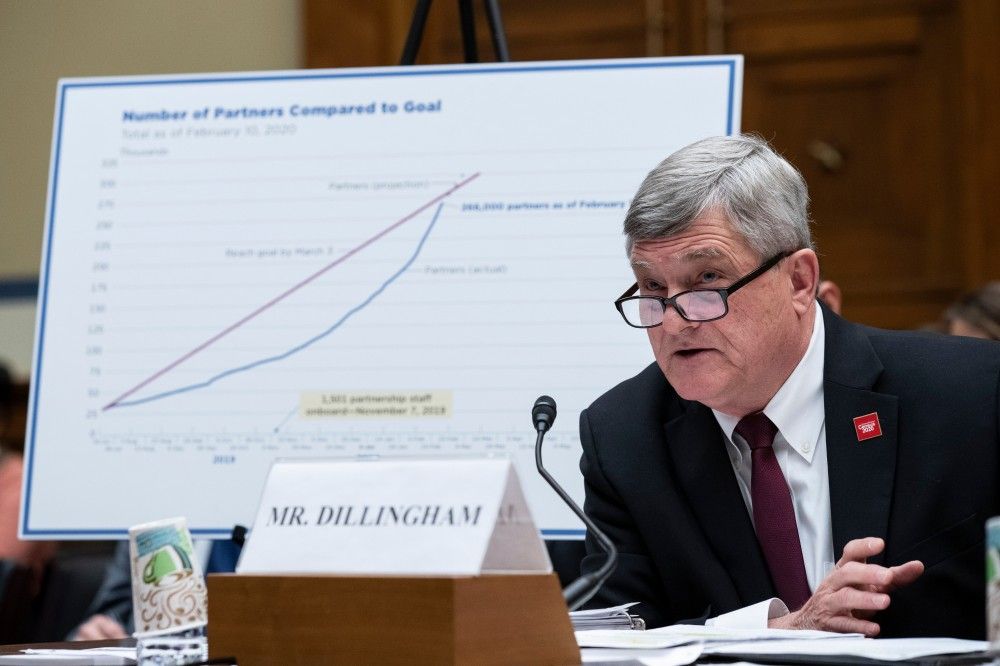
The 2020 Census Is Showing Some Strong Iowa Caucus Energy
The 2020 is nearly upon us, and signs are emerging that the once-in-a-decade survey of the American population could experience some issues if the Census Bureau doesn’t start taking the technological elements of the operation more seriously — and fast.
Last Wednesday, a troubling report from the nonpartisan Government Accountability Office was made public during a House Committee on Oversight and Reform hearing on the Census Bureau’s preparedness for the 2020 survey. The GAO’s report found that the Census Bureau is behind on recruiting Census workers, developing partnerships with civic groups, and testing the technology with which the Census will be administered.
The Census has already begun in some parts of Alaska, and will open nationwide on April 1st. Despite the contents of GAO’s report, Census Bureau Director Steven Dillingham assured Congress everything is going to be just fine. “We are confident that we are on mission, on budget and on target,” he said. “The 2020 census is positioned for success.”
But the committee’s concern is justified, particularly given the technological debacle that derailed the Iowa caucuses earlier this month, and the degree to which the 2020 survey will lean on technological infrastructure. For the first time ever, Americans are encouraged to participate in the Census online, and Census takers will log the responses of those tallied in person through a new mobile app. According to the GAO report, the states using these systems might not be in the shape to be in with one of the most complex and consequential information-gathering operations the government has ever conducted set to commence in earnest in just over a month.
According to the GAO, the Census Bureau is yet to finalize how it plans to back up the results from the online questionnaire. Officials only decided last week to use a backup system at all, and the one they are planning to implement — an in-house system called Primus — was not tested during a Census trial run conducted in Rhode Island in 2018. Meanwhile, the app that will be used by door-to-door Census takers is experiencing issues, the causes of which officials have yet to identify.
“Late design changes such as a shift from one system to another can introduce new risks during a critical moment,” Nick Marinos, the GAO’s director of information technology, warned Congress last week. “The bureau needs to quickly ensure that the system is ready and that contingency plans are finalized to reflect this change and fully tested before going live.”
The issues the GAO highlighted seem eerily reminiscent to those that plagued the Iowa caucuses, for which the Iowa Democratic Party rushed to construct an app that then wasn’t adequately tested. A similar scramble to ensure the security and efficacy of new technology is at the heart of the GAO’s concern with the Census Bureau. “Where the risk is, is just time,” said Marinos. “We are in a pressure cooker of time to get things done.”
But while less than 200,000 people turned out for the Iowa caucuses, the Census Bureau is tasked with tabulating the entire American population, a monumental task that could result in disaster if botched. In addition to providing anyone browsing through the United States Wikipedia page with an updated population tally, the Census results will determine how $1.5 trillion in federal money is allocated, as well as how congressional seats are apportioned.
This means the 2020 Census could be a ripe target for hackers and, wouldn’t you know it, the system’s cybersecurity isn’t quite up to snuff, either. In addition to the still-in-flux backup system, as of the end of 2019 the Census Bureau still needed to address 191 cybersecurity issues deemed “high risk” or “very high risk,” according to the GAO.
There’s always the temptation to see conspiracy and malice where there’s just chaos and incompetence, but there are legitimate reasons to believe that all these census problems may not be solely the result of this administration’s indifference to some of the basics of government. A robust Census that produces the most accurate possible count would include people typically left at society’s margins, including in largely nonwhite communities. The Trump administration has shown a near-constant willingness to stifle those communities’ political power and prevent government resources from being devoted to their well-being, and a shoddy Census could further that goal for a decade.
The administration already battled (unsuccessfully) to put a citizenship question on the Census, a move that critics argued was designed to suppress turnout in areas with large immigrant populations. And it’s unclear whether the Census Bureau is doing enough to reassure hesitant minority communities that their citizenship status will not be called into question if they participate, or to counter Republican efforts to stifle turnout, like sending out fundraising mailers deliberately disguised as an official Census forms.
“We have to respond to this report by GAO,” Oversight and Reform Committee Chairwoman Carolyn Maloney (D-N.Y.) said at the end of Wednesday’s hearing. “Our most vulnerable communities will suffer. They will lose representation and critical funding for schools and healthcare. Do everything in your power to ensure every person everyone community is counted.”



